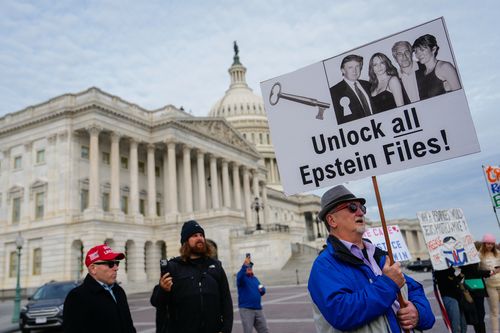Share this @internewscast.com
Congress has taken a significant step by forwarding a bill to President Donald Trump that mandates the public release of the Justice Department’s case files on Jeffrey Epstein, the notorious convicted sex offender. This move is a pivotal moment in the ongoing quest by Epstein’s victims for transparency and accountability.
This week, both the House and Senate approved the bill with decisive majorities, following President Trump’s change of heart after months of opposing it. His agreement to sign the bill will initiate a 30-day deadline for the Justice Department to disclose what has become known as the Epstein files.
Senate Democratic leader Chuck Schumer emphasized the importance of this legislation, stating, “This bill demands complete transparency from the president, ensuring that he provides the American public with full honesty.”

The anticipation surrounding the release of these documents is considerable, as they are expected to name numerous individuals involved in investigations spanning over ten years. However, concerns persist that mere mention within these files could lead to assumptions of guilt or complicity.
Epstein, who was well connected to a variety of influential circles, including political leaders, academics, and billionaires, has already seen some of his communications unveiled by a House Oversight Committee investigation. These documents highlighted interactions with President Trump and other prominent figures.
Despite the push for transparency, federal prosecutors are bound by strict guidelines regarding the information they disclose publicly or in court. These guidelines aim to protect victims and ensure the integrity of the legal process.
House Speaker Mike Johnson raised objections to the bill on those grounds this week, arguing that it could reveal unwanted information on victims as well as others who were in contact with investigators.
Still, Johnson did not actually try to make changes to the bill and voted for it on the House floor.
For the bill’s proponents, a public reckoning over the investigation is precisely the point. Some of the survivors of trafficking from Epstein and Maxwell have sought ways to name people they accuse of being complicit or involved, but fear they will face lawsuits from the men they accuse.
Massie said that he wants the FBI to release the reports from its interviews with the victims.
Those reports typically contain unvetted information, but Massie said he is determined to name those who are accused. He and Greene have offered to read the names of those accused on the House floor, which would shield their speech from legal consequences.
“We need names,” Massie said.













